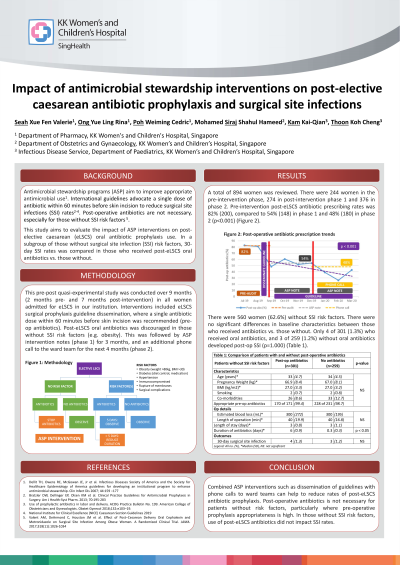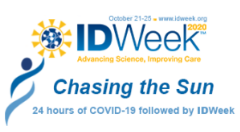Category: Antimicrobial Stewardship: Outcomes Assessment (clinical and economic)
Poster Session: Antimicrobial Stewardship: Outcomes Assessment (clinical and economic)
69 - Impact of Antimicrobial Stewardship Interventions on Post-elective Caesarean Antibiotic Prophylaxis and Surgical Site Infections

- XS
Xue Fen Valerie Seah
Pharmacist
KK Women's and Children's Hospital, Singapore
Singapore, SingaporeDisclosure: I do not have any relevant financial / non-financial relationships with any proprietary interests.
Presenting Author(s)
Background:
Antimicrobial stewardship programs (ASP) aim to improve appropriate antimicrobial use. This study aims to evaluate the impact of ASP interventions on post-elective caesarean (eLSCS) oral antibiotic prophylaxis use. In a subgroup of those without surgical site infection (SSI) risk factors, 30-day SSI rates was compared in those who received post-eLSCS oral antibiotics vs. those without.
Methods:
This pre-post quasi-experimental study was conducted over 9 months (2 months pre- and 7 months post-intervention) in all women admitted for eLSCS in our institution. Interventions included eLSCS surgical prophylaxis guideline dissemination, where a single antibiotic dose within 60 minutes before skin incision was recommended. Post-eLSCS oral antibiotics was discouraged in those without SSI risk factors (e.g. obesity). This was followed by ASP intervention notes (phase 1) for 3 months, and an additional phone call to the ward team for the next 4 months (phase 2).
Results:
A total of 894 women were reviewed. There were 244 women in the pre-intervention phase, 274 in post-intervention phase 1 and 376 in phase 2. Pre-intervention post-eLSCS antibiotic prescribing rates was 82% (200), compared to 54% (148) in phase 1 and 49% (180) in phase 2 (p< 0.001). There were 560 women without SSI risk factors. Of these, only 4 of 301 (1.3%) who received oral antibiotics, and 3 of 259 (1.2%) without oral antibiotics developed post-op SSI (p=1.000).
Conclusion:
ASP can reduce post-eLSCS antibiotic prophylaxis. In those without SSI risk factors, use of post-eLSCS oral antibiotics did not impact SSI rates.

